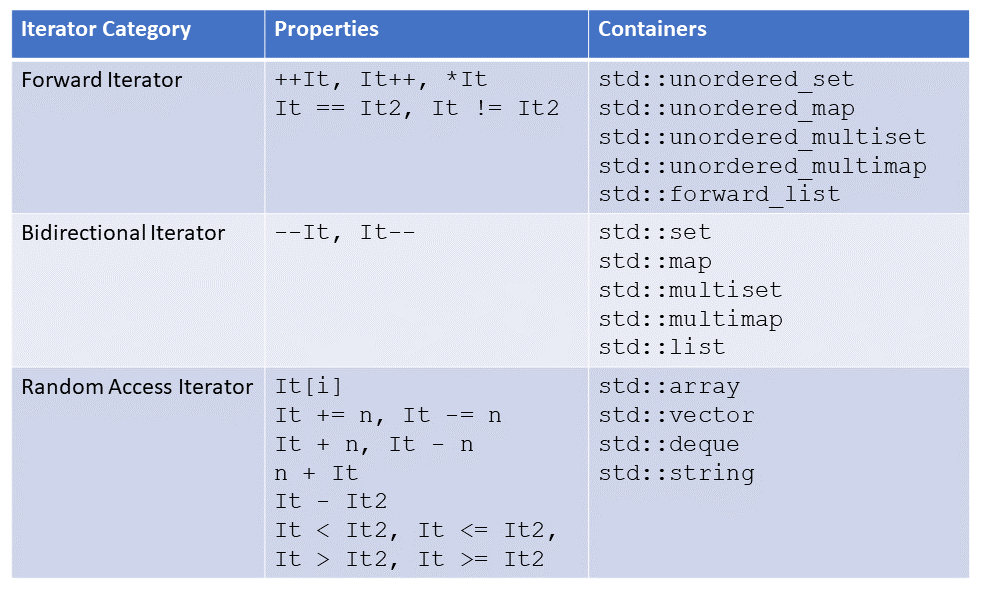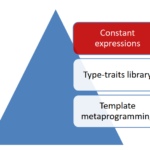C++ Core Guidelines: Other Template Rules
Today, I write about the few remaining rules to templates. Because a collective name is missing, they put the heterogeneous rules to templates in the section other. The rules are about best practices but also about surprises.

Here are the rules for this post.
- T.140: Name all operations with potential for reuse
- T.141: Use an unnamed lambda if you need a simple function object in one place only
- T.143: Don’t write unintentionally nongeneric code
The first rule is about best practices.
T.140: Name all operations with potential for reuse
Honestly, I’m not so sure why this rule belongs to templates. Maybe templates are about reuse, or the example in the guidelines uses the std::find_if algorithm of the Standard Template Library. Anyway, the rule is fundamental from the code quality perspective.
Imagine you have a vector of records. Each record consists of a name, an address, and an id. You often want to find a record with a specific name; but to make it more challenging, you ignore the case sensitivity of the names.
// records.cpp #include <algorithm> #include <cctype> #include <iostream> #include <string> #include <vector> struct Rec { // (1) std::string name; std::string addr; int id; }; int main(){ std::cout << std::endl; std::vector<Rec> vr{ {"Grimm", "Munich", 1}, // (2) {"huber", "Stuttgart", 2}, {"Smith", "Rottenburg", 3}, {"black", "Hanover", 4} }; std::string name = "smith"; auto rec = std::find_if(vr.begin(), vr.end(), [&](Rec& r) { // (3) if (r.name.size() != name.size()) return false; for (int i = 0; i < r.name.size(); ++i){ if (std::tolower(r.name[i]) != std::tolower(name[i])) return false; } return true; }); if (rec != vr.end()){ std::cout << rec->name << ", " << rec->addr << ", " << rec->id << std::endl; } std::cout << std::endl; }
The struct Rec (line 1) has only public members; therefore, I can use aggregate initialization and initialize all members directly in line (2). In line (3), I use a lambda function to search for the ” smith ” record. First, I check if both names have the same size and second if the characters are identical when compared to case-insensitive.

 Modernes C++ Mentoring
Modernes C++ Mentoring
Do you want to stay informed: Subscribe.
What’s the problem with the code? The requirement of the case-insensitive comparison of strings is too common, and we should put the solution in an object, give it a name and reuse it.
bool compare_insensitive(const std::string& a, const std::string& b) // (1) { if (a.size() != b.size()) return false; for (int i = 0; i < a.size(); ++i){ if (std::tolower(a[i]) != std::tolower(b[i])) return false; } return true; } std::string name = "smith"; auto res = std::find_if(vr.begin(), vr.end(), [&](Rec& r) { compare_insensitive(r.name, name); } ); std::vector<std::string> vs{"Grimm", "huber", "Smith", "black"}; // (2) auto res2 = std::find_if(vs.begin(), vs.end(), [&](std::string& r) { compare_insensitive(r, name); } );
The function compare_insensitive (line 1) gives a general concept a name. Now, I can use it for a vector of strings (line 2).
T.141: Use an unnamed lambda if you need a simple function object in one place only
I often discuss this in my classes: When should I use a function (function object) or a lambda function? Honestly, I have no easy answer. Here, two meta-rules of code quality contradict:
- Don’t repeat yourself. (DRY)
- Explicit is better than implicit. (The Zen of Python)
Sorry, I borrowed the second point from Python. But what does that mean? Imagine you have an old-fashioned Fortran programmer in your team, and he says to you: “Each name must have three characters.” So, you end with the following code.
auto eUE = std::remove_if(use.begin(), use.end(), igh);
What does the name igh stand for? igh stands for a id greater hundred. Now, you are forced to document the usage of the predicate.
But If you use a lambda function, the code documents itself.
auto earlyUsersEnd = std::remove_if(users.begin(), users.end(), [](const User &user) { return user.id > 100; });
I had discussions with Fortran programmers about names. Admittedly, more arguments, such as code locality versus code size, speak for or against lambda functions, but “Don’t repeat yourself” versus “Explicit is better than implicit” are my key arguments.
T.143: Don’t write unintentionally nongeneric code
A short example says more than a long explanation. In the following example, I iterate through a std::vector, a std::deque, and a std::list.
// notGeneric.cpp #include <deque> #include <list> #include <vector> template <typename Cont> void justIterate(const Cont& cont){ const auto itEnd = cont.end(); for (auto it = cont.begin(); it < itEnd; ++it) { // (1) // do something } } int main(){ std::vector<int> vecInt{1, 2, 3, 4, 5}; justIterate(vecInt); // (2) std::deque<int> deqInt{1, 2, 3, 4, 5}; justIterate(deqInt); // (3) std::list<int> listInt{1, 2, 3, 4, 5}; justIterate(listInt); // (4) }
The code looks innocent, but the compilation breaks when I want to compile the program. I get about 100 lines of error messages.

At the beginning of the error message, you see it is quite precise: “notGeneric.cpp:10:37: error: no match for ‘operator<‘ (operand types are ‘std::_List_const_iterator“.
What is the issue? The issue is in line (1). The iterator comparison (<) works for the std::vector (line 2) and the std::deque (line 3) but breaks for the std::list (line 4). Each container returns an iterator representing its structure. This is in the case of a std::vector and a std::deque, a random access iterator, and in the case of the std::list, a bidirectional iterator. A look at the iterator categories helps a lot.

The random access iterator category is a superset of the bidirectional iterator category, and the bidirectional iterator category is a superset of the forward iterator category. Now, the issue is obvious. An iterator given by a list does not support the smaller comparison. Fixing the bug is relatively easy. Iterators of each iterator category support the != comparison. Here is the fixed justIterate function template.
template <typename Cont> void justIterate(const Cont& cont){ const auto itEnd = cont.end(); for (auto it = cont.begin(); it != itEnd; ++it) { // (1) // do something } }
By the way, it is typically a bad idea to loop through a container such as I do in the function justIterate. This is a job for an appropriate algorithm of the standard template library.
What’s next?
My original plan was to write today about rule T.144: Don’t specialize function templates. This rule holds a significant surprise potential. You will see what I mean in the next post.
Thanks a lot to my Patreon Supporters: Matt Braun, Roman Postanciuc, Tobias Zindl, G Prvulovic, Reinhold Dröge, Abernitzke, Frank Grimm, Sakib, Broeserl, António Pina, Sergey Agafyin, Андрей Бурмистров, Jake, GS, Lawton Shoemake, Jozo Leko, John Breland, Venkat Nandam, Jose Francisco, Douglas Tinkham, Kuchlong Kuchlong, Robert Blanch, Truels Wissneth, Mario Luoni, Friedrich Huber, lennonli, Pramod Tikare Muralidhara, Peter Ware, Daniel Hufschläger, Alessandro Pezzato, Bob Perry, Satish Vangipuram, Andi Ireland, Richard Ohnemus, Michael Dunsky, Leo Goodstadt, John Wiederhirn, Yacob Cohen-Arazi, Florian Tischler, Robin Furness, Michael Young, Holger Detering, Bernd Mühlhaus, Stephen Kelley, Kyle Dean, Tusar Palauri, Juan Dent, George Liao, Daniel Ceperley, Jon T Hess, Stephen Totten, Wolfgang Fütterer, Matthias Grün, Ben Atakora, Ann Shatoff, Rob North, Bhavith C Achar, Marco Parri Empoli, Philipp Lenk, Charles-Jianye Chen, Keith Jeffery, Matt Godbolt, Honey Sukesan, bruce_lee_wayne, Silviu Ardelean, schnapper79, Seeker, and Sundareswaran Senthilvel.
Thanks, in particular, to Jon Hess, Lakshman, Christian Wittenhorst, Sherhy Pyton, Dendi Suhubdy, Sudhakar Belagurusamy, Richard Sargeant, Rusty Fleming, John Nebel, Mipko, Alicja Kaminska, Slavko Radman, and David Poole.
| My special thanks to Embarcadero |  |
| My special thanks to PVS-Studio |  |
| My special thanks to Tipi.build |  |
| My special thanks to Take Up Code |  |
| My special thanks to SHAVEDYAKS |  |
Modernes C++ GmbH
Modernes C++ Mentoring (English)
Rainer Grimm
Yalovastraße 20
72108 Rottenburg
Mail: schulung@ModernesCpp.de
Mentoring: www.ModernesCpp.org




Leave a Reply
Want to join the discussion?Feel free to contribute!